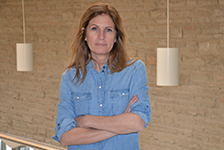Digging deeper into the meaning of post-secondary education
Neoliberalism is a powerful economic force and one graduate student is studying to determine how it’s influencing post-secondary institutions.

Melanie Lawrence
Melanie Lawrence, a graduate student in Critical Policy, Equity and Leadership Studies, is currently exploring how faculty members and administrators enact Quality Assurance policy framed by a neoliberal rationality in higher education. Lawrence, who is planning on defending her thesis in 2019, is continuing her work that she started as a Master of Arts student at the Faculty of Education. As a Master’s student her paper, Beyond the Neoliberal Imaginary: Investigating the Critical Pedagogy in Higher Education , was published in the Journal for Critical Education Policy Studies.
Lawrence describes neoliberalism as a contested concept that views all human activities through economics. For her paper, she studied three academics who identified as critical pedagogues in social sciences. She wanted to see how these academics were affected by neoliberalism and how it challenged them as researchers and as teachers.
Lawrence conducted her case study using critical pedagogy theory. Lawrence described critical pedagogy as an examination of systems of power and oppression. The theory looks at those voices heard, and perhaps more important, voices that aren’t heard in published research. Researchers also address their own biases and recognize how their social and economic status as well as their political beliefs affect their research and teaching.
Lawrence argues neoliberalism “has changed how those who teach using a critical perspective are assessed” by students. It has also restored “class power to a degree not experienced since the pre-Depression era.”
As a PhD student, Lawrence has expanded her inquiry into neoliberalism by looking at how market forces are threatening how higher education is valued. While Lawrence sees market forces challenging universities, she’s optimistic about the future of post-secondary education.
She’s also enthusiastic about her publishing experience. She said graduate students shouldn’t be daunted by the publishing process.
“My hope is that grad students will embrace it. Each rejection is a learning curve. I learned tremendously from each rejection I received. They helped me tremendously.”

